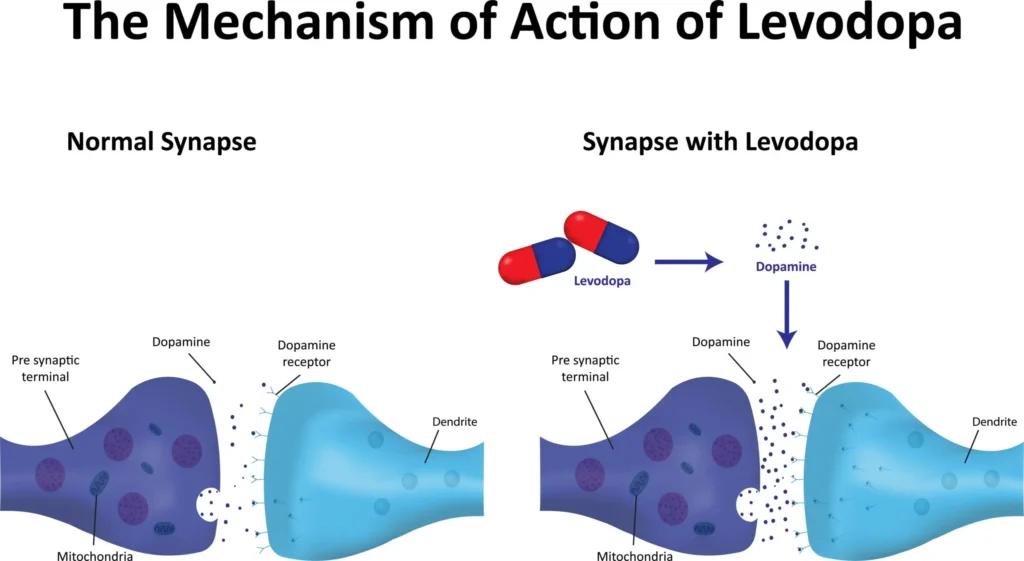Levodopa (L-Dopa) and Carbidopa are used in combination to manage the symptoms of Parkinson’s disease (PD), a neurodegenerative disorder characterized by tremors, rigidity, and bradykinesia. The pharmacology of these drugs hinges on the modulation of dopamine activity in the brain, given the critical role dopamine deficiency plays in the manifestation of Parkinson’s disease symptoms. Below is a detailed elucidation of their pharmacology:
Levodopa:
- Precursor to Dopamine: Levodopa acts as a precursor to dopamine. Once administered, it traverses the blood-brain barrier and is then converted to dopamine in the brain, thus compensating for the dopamine deficit seen in Parkinson’s disease patients1.

- Effective for Bradykinesia: It is effectively used to control bradykinetic symptoms apparent in Parkinson’s disease and is typically prescribed once symptoms become more difficult to control with other anti-parkinsonism drugs1.
- Long-term Application: Long-term application of Levodopa, especially in combination with decarboxylase inhibitors, supports the onset of more continuous movement by ameliorating fluctuations in motor behavior2.
Carbidopa:
- Decarboxylase Inhibitor: Carbidopa belongs to the class of decarboxylase inhibitors. It prevents Levodopa from being broken down before it reaches the brain, thus ensuring more Levodopa is available to be converted to dopamine34.
- Enhances Levodopa Efficiency: By inhibiting peripheral plasma breakdown of Levodopa, Carbidopa increases the availability of Levodopa at the blood-brain barrier, thereby enhancing its efficiency in replenishing dopamine levels in the brain5.
Combined Therapy:
- Synergistic Effect: The co-administration of Levodopa and Carbidopa is aimed at maximizing the amount of Levodopa that reaches the brain while minimizing peripheral side effects. This combination allows for a lower dose of Levodopa, which causes fewer side effects, particularly nausea and vomiting3.
- Pharmacokinetic and Pharmacodynamic Features: The combination also supports a more continuous dopamine substitution, which is beneficial in ameliorating fluctuations of motor behavior in PD patients. Moreover, the inhibition of both catechol-O-methyltransferase and monoamine oxidase-B alongside this combination enhances antioxidative defense and methylation capacity, which in turn reduces oxidative stress in the brain and reduces homocysteine synthesis due to diminished consumption of methyl groups for Levodopa turnover at least in the periphery2.
The pharmacology of Levodopa and Carbidopa highlights a well-orchestrated interplay aimed at replenishing dopamine levels in the brain, thereby providing symptomatic relief for individuals with Parkinson’s disease. Through the inhibition of peripheral Levodopa breakdown by Carbidopa, this combination ensures a more effective and sustained dopamine replacement, which is fundamental in managing the motor symptoms of Parkinson’s disease.
Medical Disclaimer
The medical information on this post is for general educational purposes only and is provided by Pharmacology Mentor. While we strive to keep content current and accurate, Pharmacology Mentor makes no representations or warranties, express or implied, regarding the completeness, accuracy, reliability, suitability, or availability of the post, the website, or any information, products, services, or related graphics for any purpose. This content is not a substitute for professional medical advice, diagnosis, or treatment; always seek the advice of your physician or other qualified health provider with any questions you may have regarding a medical condition and never disregard or delay seeking professional advice because of something you have read here. Reliance on any information provided is solely at your own risk.

